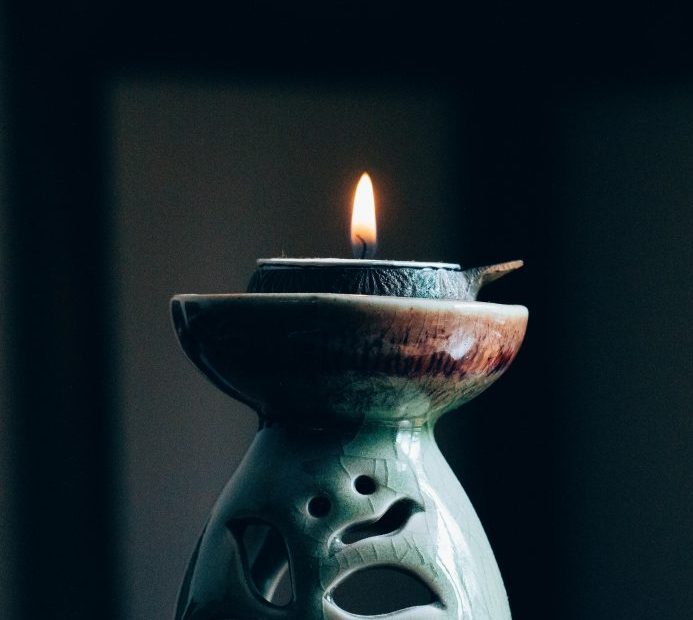Tea Qi
Qi “literally means breath,” refers to energy, flow, movement. Qi is the movement of all things. It is also the subtle energy present in our bodies. Tea has its own Qi, as all things are endowed with one.
When we drink a cup of good tea we are incorporating its Qi, which goes to merge with that of our body. But it is not easy to feel the action of this Qi on our subtle body. We have to be receptive, drink good quality tea and drink at least 2-3 cups, which is then also what science recommends in order to have the beneficial properties that everyone talks about. A bagged or poor quality tea hardly possesses Qi. (read there)
Surely we can help ourselves develop this sensitivity with training. Tea can become our meditation.
The value of time
To do this we must provide ourselves with a commodity that is rare, precious and expensive today. Time.
We need to take at least an hour or so to prepare, calm down, and then brew our tea, savor it, feel it, infuse it again, letting its liquid permeate us and let its Qi merge with ours going to dissolve where there are blockages.
There are some little tips for doing this:
- We must have objects suitable for making good tea
- We must use good water
- We must use good tea
- When we prepare tea our heart must be calm and at peace
- When we drink tea we can do so sitting down, with our eyes closed, inhaling deeply, focusing our attention on the nuances of smell and taste it gives off
- Then we focus on the ingested tea, on the warmth it transmits to us in the intestinal tract and stomach
- We try to calm the mind and thoughts through it all
The tools and space are important because over time they will help us sacralize the process, time and place where we prepare and enjoy our tea. So place love and attention to where you brew tea and with what.
Everything revolves around simplicity, just as the Chinese characters for the word “Zen” mean to manifest simplicity.
Zen and tea are 2 worlds closely connected. Both inwardly and outwardly. That is, both in their essence and in their history.
A bit of history
Historically, the arrival of tea in Japan can be traced back to the first Chinese monks who were tasked with bringing the discipline of the Buddha to the Land of the Rising Sun.
We are around the 10th century. As contacts between Buddhism took hold in Japan more and more monks were won over by the discipline and went to study it in China. Here they came in contact with tea and were bewitched by it, and so they began to bring both the seeds and leaves back to Japan, slowly contributing to the spread of the drink.
One of the monks who contributed most to its spread was Eisai (but that would require a separate article for him)
Many words could be spent, with historical mentions, bibliographies etc., but just as Zen masters respond with paradoxes, koans and cryptic phrases when asked about Zen, the same applies to tea.
It is best to sit and practice, drinking a cup with proper attention and awareness. Tea drinking is also and above all an experience, just as Zen is a state of mind.
The simplicity of a cup of tea can help us to enter a more Zen state, to escape from everyday rationality to focus in greater presence.
Tea as an Antidote
One of the most common pathologies today is to fill every hole of time with something, some activity, this is made possible and encouraged by smartphones, apps and games within everyone’s reach, from early years to old age. It becomes increasingly difficult to be without doing anything, almost impossible, with all the stimuli to which we are subjected.
The practice of tea, making it and simply drinking it, can be an antidote to all this.
If doing nothing, sitting still with a blank mind is so difficult to do with a cup of tea that we have prepared is a little easier.
It can help us disconnect from our smartphones, social media, and news and bring us into a world that is more “ours,” a little more intimate and less sterile. Get us away from distractions, from our goals, from judgment, including the method we used to make this tea. We dive into our cup of tea and its preparation, to rest a bit and let some time slip away.
Preparing tea does not have to be an activity in which we have to become expert teamasters. Sure we need to know a few principles so that we can best respect the leaves and extract an excellent liquid for ourselves and our guests. But it should not become a fixation. As in all communities, even in the tea community there is the constant danger of extremist drift!
But all these words keep pulling us away from the true experience, the true state of Zen. So let us prepare a cup of tea and immerse ourselves in this practice of presence, trying to simply live the experience, without too many thoughts, goals. A practice that serves no purpose! Only to have a good and beautiful practice!
